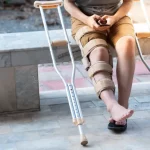Obesity is not just a matter of appearance. It is a medical term that refers to a serious medical condition that can cause serious damage to health and shorten life expectancy. As a rehabilitation physician with twenty years of experience, I have seen how this disease reduces the quality of life of patients and their loved ones.
Obesity is characterized by an excessive accumulation of fat in the body, which leads to an increase in body weight of 20% or more of normal. This disease increases the risk of developing cardiovascular disease, type 2 diabetes, arthritis and other serious health problems.
Obesity and its impact on quality of life and health

Physical impact of obesity on health
Obesity leads to a variety of health-related problems, such as cardiovascular diseases, type 2 diabetes, arthritis and certain cancers. This is due to overweight increasing load on the organs, especially the heart and joints.
Which diseases can obesity cause?
Obesity can lead to a variety of diseases and conditions, including:
Cardiovascular diseases: Overweight increases the risk of hypertension (high blood pressure), atherosclerosis (a disease in which fatty plaques are formed on the walls of the arteries), coronary heart disease and stroke.
Type 2 diabetes: Obesity is one of the main causes of type 2 diabetes, as overweight leads to the development of insulin resistance, a condition in which the body’s cells become unresponsive to insulin.
Arthritis: Overweight increases load on the joints, especially the knees and hips, leading to the development of arthritis.
Cancer: Obesity is also associated with an increased risk of certain cancers, including breast cancer, colon cancer and colorectal cancer.
Sleep apnea: This breathing disorder that causes temporary cessation of breathing during sleep is common in obese individuals.
Psychological impact of obesity on quality of life
Obesity not only affects physical health, but it can also cause a number of psychological problems, including depression, anxiety, and low self-esteem. This is due to both self-awareness and the stigma of obesity in society.
Depression and anxiety: Studies show that obese people often experience depression and anxiety. This can be due to both self-awareness and stigmatization, as well as the physiological changes caused by obesity.
Low self-esteem and social isolation: Due to the stigma associated with obesity, overweight people may experience low self-esteem and social isolation. They may avoid public places for fear of judgment, which in turn can lead to poor mental health.
Obesity and general quality of life
General quality of life can be significantly impaired due to obesity. Joint pain and mobility limitations can prevent you from completing daily tasks and participating in your favorite activities. Obesity can affect the ability to work, learn and participate in social life, which in turn can lead to a deterioration in overall quality of life.
Causes of obesity

Role of genetics in obesity
Scientists have long found out that genetics play an important role in the development of obesity. In some families, obesity is inherited from generation to generation. However, this does not mean that if your parents are obese, you will automatically have overweight problems. Genes only determine the tendency to obesity, but the final result is highly dependent on lifestyle.
Eating habits and lifestyle
The habit of overeating, especially high-calorie, fatty and sugary foods, is the main cause of obesity. Irregular meals, snacking on the go, skipping breakfast – all this leads to weight gain. Insufficient physical activity also contributes to weight gain, as the body does not waste calories from food.
Diseases that can cause obesity
Certain diseases and medical conditions can lead to obesity. This includes polycystic ovary syndrome, Cushing’s syndrome, hypothyroidism, and several other hormonal disorders. Some drugs can also cause weight gain. If you notice a sudden increase in weight while taking any medication, be sure to discuss it with your physician.
Symptoms and сonsequences of obesity

Obesity has a direct impact on physical well-being and general health. It ranges from the increased fatigue to serious diseases, the effects of obesity can be profound and long-lasting.
How to recognize obesity
Obesity is usually defined by the ratio of body weight to height, known as body mass index (BMI). People with a BMI of 30 or higher are classified as obese. However, BMI is not the only parameter. The distribution of fat throughout the body also matters. For example, fat that accumulates around the waist (apple shape) poses a greater health risk than fat in the thighs (pear-shaped).
Symptoms of obesity include:
-
Excess fat around the waist or hips;
-
Difficulty performing physical activity;
-
Fatigue;
-
Dyspnea;
-
Sweating;
-
Insomnia or sleep apnea;
-
Skin problems due to friction and sweating.
Obesity treatment methods

Treating obesity involves many different approaches, from lifestyle changes to medical intervention. The key to successful treatment of obesity is the consistent adoption of healthy eating habits and physical activity.
Physical Activity
Physical activity is a key element in the treatment of obesity. Regular exercise helps to increase the total number of calories burned and improve overall fitness. Start slowly and then gradually increase the intensity and duration of exercises.
For example, start with walks. Start with 5-10 minutes a day, then gradually increase the time to 30-60 minutes a day. After your fitness improves, you can add strength exercises such as pull-ups, sit-ups, push-ups.
It is important to remember that exercises should be done correctly to avoid injury. Therefore, it is important to consult with a trainer or physical therapist who can help you develop an exercise program that is appropriate for you.
Drug treatment
In Russia, various drugs are used to treat obesity. They may be prescribed by a physician if lifestyle changes and physical activity are not efficient enough. It is important to remember that these medications should only be taken as prescribed by a physician and in combination with a healthy lifestyle.
- Orlistat (Xenical, Orsoten): This is a drug that reduces energy value of food by blocking the absorption of fat in the intestines.
- Sibutramine (Meridia): This is a drug that alters brain chemistry, reducing appetite. However, it can cause an increase in blood pressure and heart rate, so it is used strictly under medical supervision.
- Metformin (Glucophage): It is commonly used to treat type 2 diabetes, but is sometimes prescribed to treat obesity, especially if a patient has concomitant diabetes mellitus.
These medications are not a miracle cure and work best when combined with lifestyle changes, including diet and exercise. In addition, they can have adverse effects and they should be applied under strict medical supervision.
Surgery
In extreme cases, when other methods have failed, surgery such as gastric reduction surgery may be recommended.
Video: “EXERCISES FOR OVERWEIGHT | OBESE PEOPLE”
EXERCISES FOR OVERWEIGHT | OBESE PEOPLE. SET NO. 1: GENERAL EXERCISES TO STRENGTHEN MUSCLES AND IMPROVE JOINT MOBILITY
For additional information about Rehabilitation of the patients with Obesity you can watch a video demonstrating exercises and rehabilitation recommendations.
Advantages of using GHRS-GROUP rehabilitation methods

GHRS-GROUP offers unique recovery methods for people suffering from obesity. These methods are based on most advanced research and techniques used in Israel, a country with the leading position in medical science and technology.
One of the key aspects of the recovery methods offered by GHRS-GROUP is the ability to provide rehabilitation at home. This is not only convenient, but also allows for an individual approach, taking into account the specifics of each patient’s health condition. As part of home rehabilitation, GHRS-GROUP specialists provide full support and monitoring of the patient’s progress, which ensures high treatment efficacy.
Moreover, the use of recovery techniques by GHRS-GROUP allows access to the latest developments in the field of rehabilitation that may not be available in other facilities. These techniques include advanced technology and innovative approaches to rehabilitation, resulting in a faster and more effective recovery.
All this makes GHRS-GROUP an ideal choice for those who are looking for high-quality and effective methods of recovery from obesity.
You can familiarize yourself with some of these exercises by watching the demo video on our website. These video exercises for weight loss demonstrate various techniques and methods to help you recover and get back into the desired shape.
GHRS-GROUP specialists also offer individual consultations and support at every stage of recovery to help you achieve your goals in the struggle with obesity.
Rehabilitation in obesity

Rehabilitation in obesity is a complex process that includes psychological, dietetic, and physical support. Rehabilitation not only helps people achieve and maintain a healthy weight, but it also improves their overall quality of life, helps improve self-esteem, and regain healthy habits.
Why rehabilitation after obesity treatment is important
Once obesity has been treated, whether with diet, physical activity, drug treatment or surgery, rehabilitation becomes a key step on the road to recovery. It helps to eliminate the consequences of the disease, prevents relapses and contributes to the restoration of normal physical activity and social adaptation.
Psychological support
The fight against obesity is not only a physical struggle, but also a psychological one. Psychological support plays a key role in rehabilitation, helping people overcome negative emotions and thoughts related to their disease and motivating them to live a healthy lifestyle.
Physical rehabilitation
Physical rehabilitation helps to restore mobility, strengthen muscles and improve overall fitness. It is important to choose an individual exercise program that will take into account age, obesity and general health.
Dietetics in obesity rehabilitation

Adequate diet is one of the key factors for success in the struggle against obesity. Together with a dietitian, a nutrition plan is developed that meets the body’s nutritional needs while still promoting weight loss.
To achieve great results, it is recommended to use a comprehensive approach to rehabilitation, which includes all of the above-mentioned aspects.
How to eat correctly after obesity treatment
Adequate diet plays an important role in rehabilitation after obesity treatment. Your diet should be balanced and complete, providing all the nutrients you need while still maintaining a healthy weight.
- Divide your meal into 5-6 meals per day. This will help keep blood sugar levels stable and prevent overeating.
- Include more vegetables and fruits in your diet. They are rich in vitamins, minerals, and fiber that help you feel full.
- Choose low-fat proteins. Proteins help to fill up and maintain muscle mass. Choose low-fat meats, fish, poultry, legumes and low-fat dairy.
- Limit simple carbohydrates. Avoid foods high in sugar and white bread. Instead, choose whole grain products, which contain more dietary fiber and help keep blood sugar levels stable.
- Reduce your intake of saturated fats and trans fats. These types of fats can contribute to high blood cholesterol levels and the development of heart disease.
- Drink a lot of water. Water helps maintain hydration and can help reduce hunger.
- Be mindful of portion sizes. Understanding what the serving size should be helps you control your calorie intake.
It’s important to remember that every person is unique, and what works for one person may not work for another. That’s why it is important to discuss your meal plan with a dietitian or physician who can accommodate your individual needs and goals.
Healthy lifestyle as a prevention of obesity
Following a healthy lifestyle is the best way to prevent obesity.

Adoption of a healthy lifestyle plays a critical role in the prevention of obesity. Incorporating a healthy diet, regular exercises and adequate sleep into your daily routine can help you maintain a healthy weight and avoid long-term effects of obesity. Establishing new healthy habits can be not a simple process, but with the following tips, you can successfully transform your lifestyle.
Obesity prevention: How a healthy lifestyle can help
- Set realistic goals: Start with your small goals and gradually increase them. For example, if you are new to physical activity, start with short sessions a few times a week and gradually increase their duration and intensity.
- Create routines: Introducing new habits takes time. Gradually incorporate healthy habits into your daily routine until they become part of your routine.
- Implement a healthy diet: Pay special attention to proteins, fruits and vegetables, and limit your intake of saturated fats and sugars.
- Exercise consistently: Strive for a minimum of 150 minutes of moderate-intensity or 75 minutes of high-intensity aerobic activity per week.
- Reinforce new habits: Regularity is the key to reinforcing new habits. The more you repeat a new habit, the more it becomes a part of your life.
- Get support: Support of loved ones, friends, or a support group can be very helpful in adoption of new healthy habits.
- Celebrate your accomplishments: No matter how small or large your accomplishments are, it is important to celebrate them to keep you motivated.
- Be forgiving of yourself: Changing habits is a process, and sometimes there will be setbacks. The main thing is not to give up and keep working on your goals.
- Reach out to professionals: If you feel that you find it difficult to implement healthy habits on your own, do not hesitate to contact professionals such as nutritionists, physical therapists or psychologists.
- Belief in results: Never underestimate the power of positive thinking and belief in success. When we are confident in our abilities and believe in a positive outcome, our brain generates more motivation and energy to achieve a goal. It is important to remember that any change takes time. Be patient and do not expect instant results. Remember that every step towards a healthy lifestyle is an investment in your health and well-being.
- Start small and gradually increase the intensity: To begin with, it is not necessary to change radically all habits and form a rigid regimen. Start small – it may be a walk before bedtime or replacing some of the foods in your diet with healthier ones. Over time, as your body gets used to the new rhythm of life, you can add a little more physical activity and make your diet more restrictive. The main thing – take your time and listen to your body so that the changes will be comfortable and beneficial.
Remember, a healthy lifestyle is a long-term investment in your health and well-being. It requires constant presence, but benefits it brings are priceless.
Conclusion: Life after rehabilitation

Life after rehabilitation is a new chance for health and happiness.
Maintaining the results of rehabilitation requires effort and consistency. This may include continuing a healthy lifestyle and regular medical check-ups.
To prevent the recurrence of obesity, it is important to maintain a healthy lifestyle and be prepared for a long struggle for your health. Surround yourself with active people who lead a healthy lifestyle.
In conclusion, I would like to emphasize that obesity is a serious disease that requires a comprehensive approach to treatment and rehabilitation. I highly recommend you watching video exercises for rehabilitation in obesity, which is available on our website at the link: Video exercises for rehabilitation in obesity. This video will help you understand which exercises can be helpful during the recovery process and how to do them correctly.

CHECK OUT THE DEMO VERSION OF OUR WORKOUTS FOR REHABILITATION OF PATIENTS with obesity ON YOUTUBE
Our website presents sets of exercises for the rehabilitation of the patients with obesity in the following areas:
-
EXERCISES FOR OVERWEIGHT/OBESE PEOPLE. SET NO. 1: GENERAL EXERCISES TO STRENGTHEN MUSCLES AND IMPROVE JOINT MOBILITY
-
EXERCISES FOR OVERWEIGHT/OBESE PEOPLE. SET NO. 2: POWER EXERCISES WITH A GYMNASTIC ELASTIC BAND/TERABAND
-
EXERCISES FOR OVERWEIGHT/OBESE PEOPLE. SET NO. 3: POWER EXERCISES WITH DUMBBELLS. WEIGHT IS SELECTED INDIVIDUALLY. IT IS RECOMMENDED TO START WITH 1-2 KG
-
EXERCISES FOR OVERWEIGHT/OBESE PEOPLE. HYDROTHERAPY MODULE: SWIMMING AND HYDROTHERAPY, EXERCISES IN THE WATER
Frequently asked Questions
Question 1: How long does the obesity rehabilitation process take?
Answer: The rehabilitation time depends on the individual characteristics of the body, the initial level of physical fitness and severity of obesity. On average, you can expect noticeable results already after a few months of regular exercise and diet.
Question 2: Can rehabilitation help with extremely severe obesity?
Answer: Yes, but in extremely severe cases of obesity, rehabilitation may take longer and can be combined with other treatments, such as drug therapy or surgery.
Question 3: Is it possible to continue a normal life during rehabilitation?
Answer: Yes, most people are able to continue their normal daily lives during the rehabilitation process. However, it is important, to pay attention to your health and follow your physician’s recommendations.
Question 4: Is it necessary to completely give up your favorite food during rehabilitation?
Answer: Not necessarily. It is important to balance your diet and reduce the amount of high-calorie and unhealthy foods, but that does not mean you should refuse from everything you like completely.
Question 5 : Does stress affect obesity?
Answer: Yes, stress can contribute to weight gain, as some people “lay low” during difficult periods, resorting to high-calorie foods as a way to cope with stress.
Question 6: Does smoking and alcohol consumption affect obesity?
Answer: Yes, both smoking and drinking alcohol can contribute to the development of obesity. Both of these factors can disrupt metabolism and lead to weight gain.
Question 7: What foods should be excluded from the diet for obesity?
Answer: You should limit your intake of foods rich in simple carbohydrates, such as sweets, white flour pastries, and soda water. You should also exclude fatty and fried foods, fast food.
Question 8: Are sleep deprivation and obesity connected?
Answer: Yes, sleep deprivation can contribute to weight gain. When you do not sleep enough, the level of hormone ghrelin, which causes hunger, increases, and the level of leptin, the hormone responsible for satiety, decreases.
- Stigmatization (from the Greek στíγμα – “label, brand”) is the stigmatization, the application of stigma. In contrast to the word stigmatization, the word stigmatization can refer to the imposition of social labels. In this sense, stigmatization is the association of a quality (usually negative) with an individual or a set of people, even though this association is absent or unproven. Stigma is an integral part of many stereotypes.



